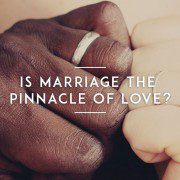From “Them” to “Me”: Confronting My Struggles with Same-Sex Attraction
Written by Naomi Goh, Singapore
“I’m pretty sure you’re not straight.” Those words struck fear deep into my heart—the months prior to this conversation with my church friends, the possibility of not being straight—of being like “Them”—had been like an open wound I was trying to ignore.
For months, I was distressed by questions like, “Having an innate affection for people, how can I differentiate between romantic love and Philos love?” “If I experience the same kind of passionate affection for any male or female I interact with, does that not mean that I am attracted to them?” “Am I actually bisexual?” The more I asked, the more convinced I was that my attraction was more than mere friendly affection.
That remark had eradicated any remaining hope I had of being a normal Christian. I was a 19-year-old new Christian, and the thought that I was something so “counter-Christian” was just frightening. What do I do now? What will the church think of me after they find out, or of my parents whom they recognize as church leaders?
Fear soon turned into shame and guilt that seemed never to wear off—the possibility of being seen as an outcast by the church was like a permanent stain on my skin that I could not wash off. Unable to deal with the overwhelming anxiety, I attempted to brush the thought aside. I did not want anything to do with being gay.
My attempts were futile. I found myself spending each day discovering new things about my experience with same-sex attraction (SSA). Gradually, certain mysteries started to make sense—I finally understood why I would always rave over the female protagonists in films more than the males, why I was so obsessed with my female teachers since kindergarten, and why I was more into girl bands than boybands. However, the more I discovered, the more afraid I became—there was no chance of denying that the Them had now become Me.
It took me two months to bring up my sexuality to someone. I was sharing an honest conversation with my pastor on my struggles in my Christian walk and felt a constant nudging to use the opportunity to answer some of my questions on God and homosexuality.
Afraid of what she would say in response, I battled myself internally. About two hours into our conversation, I blurted out, “What does the Bible say about homosexuality?”
She paused and considered my face for a moment. “Why do you ask?”
I started to feel my insides churn and my heart palpitate. I could not retract my question; what should I do? I timidly said that I would explain later—I needed time to plan my coming out in my head.
“Why do you ask?” she repeated.
“I think…I might be bisexual?”
Uttering those words threw me into a tizzy—they felt so foreign and strange coming out of my lips. Yet in the midst of the emotional buzz, my pastor gently thanked me for sharing my secret with her and reminded me that knowing that I was bisexual did not change the fact that she loved me. She ended the night by praying for me and entrusting my sorrows to the Lord.
On hindsight, perhaps it was God that had placed that question on my lips that night—it was His first prompt to glorify Him in my struggle with SSA. By using her to model His love for me, He started a budding friendship between me and this sister-in-Christ, who would eventually journey with me in my struggle, till today.
Struggling as a Christian with SSA
As much as my first coming-out brought relief in knowing that I was no longer the only one who knew about my SSA, I was still clueless and troubled over how I would continue living as a Christian.
After I recognized that I was struggling with SSA, I felt like I was walking through a minefeld every day. Not knowing how to contain my overwhelming affection for the girls I met, I resorted to chiding myself for days in order to keep myself in check each time I found myself attracted to a girl. I spent each day in anxiety, afraid that if I put my guard down I would unwittingly sin against my female peers.
After a few months, I found myself loathing myself for having SSA and increasingly frustrated by how my anxiety had made me emotionally dysfunctional. I was unproductive in school and in my interactions with my peers.
***
I first heard of Wesley Hill when my pastor passed me her copy of Washed and Waiting: Reflections on Christian Faithfulness and Homosexuality (Zondervan, 2016). Wesley’s book illustrates the brutality of his life as a Christian who experiences SSA, but who has committed his life to obeying God’s clear instruction that practicing homosexuality is a sin.
Reading Wesley’s story, I broke down in tears. It seemed as though he had read my heart and penned down my exact fear of interacting with my sisters-in-Christ and my dread of never being able to quench my desire for lifelong intimacy and companionship in the quest to remain celibate.
For the first time since I recognized my SSA, I felt God comforting me amidst my anxieties and sorrow—“You are not alone”. However, when I finished his book, I was left devastated.
Wesley offered, in one of the chapters, his insights on whether the Bible condemns Christians with SSA to lifelong loneliness. The answer was no—Wesley summed this up perfectly in his paragraph:
The remedy for loneliness – if there is such a thing this side of God’s future – is to learn, over and over again, to do this: to feel God’s keeping presence embodied in the human members of the community of faith. The church.
Wesley was able to cope with the loneliness by building honest, intimate relationships with his church community. I could never imagine myself sharing such an intimate relationship with a brother- or sister-in-Christ.
Apart from my anxiety over interacting with people of the same sex, choosing to be vulnerable and open about my struggles with the church had been a challenge. My attempts to reveal bits of my struggles with mental health and being a victim of sexual harassment had mostly been met by awkward silences; my friends immediately changing the subject of the conversation, or telling me that they had had worse experiences and that I should “suck it up and live with it”.
How could I move on when my anxiety and attraction pervaded every single moment of my day, even though I detested these emotions so much? The thought of having to share another raw piece of my life re-triggered painful memories of feeling embarrassed and ashamed whenever my brothers- and sisters-in-Christ disregarded the bits I had already mustered the courage to share.
I was also at a needy point of my life where I found it difficult to build healthy relationships with my friends. Haunted by my painful experiences with being sexually harassed, I found it difficult to love or trust my male friends even though they were not the perpetrators. I was also in a pattern of difficult friendships—while I found it difficult to receive love from friends, I was simultaneously also constantly disappointed when my uncommunicated expectations of them were not met. I grew angry with myself. Would I ever be able to form intimate trusting friendships with my peers?
My long-drawn bitterness towards the church eventually developed into bitterness towards God. If You are displeased with me pursuing a same-sex relationship, why give me SSA in the frst place? Why did You will the church to be a medium through which I experience your love, when my church does not seem to love me? Why do You bless the people around me, yet put me through such suffering? Was the Salvation given through Christ only meant for others and not me, God? Do You even love me, dear Lord?
God just felt so aloof and distant then.
Grace Transforms the “Me” to “Us”
Many months of struggling to pray and praise God later, I felt His gentle prompting again. At Wesley Hill’s 2017 conference in Singapore, he placed the current attitudes Christians hold on same-sex relationships on a spectrum.
On one end were Christians who struggled to embrace people with SSA and condemned homosexuality. On the other end were liberal Christians who believed that God will accept any believer into His kingdom, regardless of whether they are same-sex attracted or not. I found myself simultaneously at both ends of the spectrum—while I wanted to say “I am just made to be bisexual, God should accept me whether I pursue a same-sex relationship or not”, I would also beat myself up each time I thought that way so that I would detest myself for being bisexual.
Wesley offered an alternative—to be in the awkward middle. While God’s Word insists that pursuing homosexual relationships is a sin, justice has also been ensured by Christ’s blood for all of us, regardless of our sexuality.
Choosing to stay in the middle means two things. Firstly, it means a daily rejection of that part of myself that experiences same-sex attraction. This involves choosing not to meet my female friends individually when I recognize I have a desire for them, or pulling myself away from situations where I fnd myself at risk of giving in to my same-sex temptations. Secondly, it also means learning to resist self-degradation and accept that Jesus Christ has already cleansed me of my sins. I can now stand righteous and sinless in the presence of God. God was telling me “Dear child I know it will be painful, but this is where I want you to be”.
God did not stop there. Amidst my bitterness towards the church, He sent three sisters who in their separate ways embraced my broken self and constantly reminded me of how valuable and loved I was in God’s eyes. They loved me as a sister. But they also challenged me to be the church, rather than wait for the church to be the church.
Ephesians 4:4–6 (NIV) reasoned this clearly for me:
There is one body and one Spirit, just as you were called to one hope when you were called; one Lord, one faith, one baptism; one God and Father of all, who is over all and through all and in all.
I felt God softly challenging me, “You are loved and valuable in my eyes. That is why I sent my son Jesus Christ down to die for you regardless of whether you are bisexual or not, and why these sisters love you. You have been saved, just like your brothers and sisters, into the church. You are the church. Do not be afraid, I will help you love them. Go forth and start building spiritual friendships.”
***
As of May 2018, it will have been about seven months since I felt God’s prompting to learn to forgive and love the church. In these months, the number of people whom I’ve learned to be vulnerable with has increased from three to eight. I praise God each day for the love and joy I have received from these brothers and sisters, albeit after many months of wrestling with my mistrust and many disappointing attempts to love.
By God’s grace and prompting, I have also decided to dedicate my life to working as a social worker with the Unheard in our society—be they the LGBTQ community, sex workers, migrant workers or individuals from Third World nations. I am currently a Year 2 Social Work major studying in a local university, waiting in anticipation to see how God uses me to shine His light and demonstrate His love to those who, like me, were once disregarded by their community.
Of course, nothing much else has changed. It is still a daily struggle to resist the temptation of pursuing a same-sex relationship, as much as it is still a struggle to be intentional in placing Christ in the center of my relationships. There are still nights when the loneliness feels too excruciating and I have to text a sister to pray for me amidst endless sobbing. There have also been days when I give in to the temptation of feeding my SSA. However, with God’s courage I have chosen to struggle each day in anticipation of Christ’s return, when I will no longer feel lonely or struggle with my SSA. By God’s grace, I am washed clean and waiting for the time when all things will be made new.
This article was originally published in Good News For Bruised Reeds: Walking With Same-Sex Attracted Friends by Graceworks. Republished with permission.










“it also means learning to resist self-degradation and accept that Jesus Christ has already cleansed me of my sins. I can now stand righteous and sinless in the presence of God. ”
Such an important part of identifying yourself in Christ! I love this article. With friends and family who are homosexuals, I struggle with the awkward middle though that’s where I want to be sharing the love of Christ yet also not condoning their lifestyle. Thank you for this article.
“Be the church, rather than wait for the church to be the church !”
Thank’s for sharing your story, and I feel so blessed by reading this knowing that so many people including me struggling with this each day. Rather than wait for the people to be church, we can learn to be the church to reach out many souls for Christ. Praise God for His grace and mercy that He never leave us alone to go through all this.
God bless you ! <3